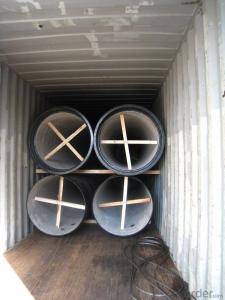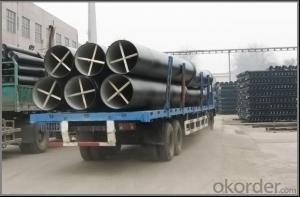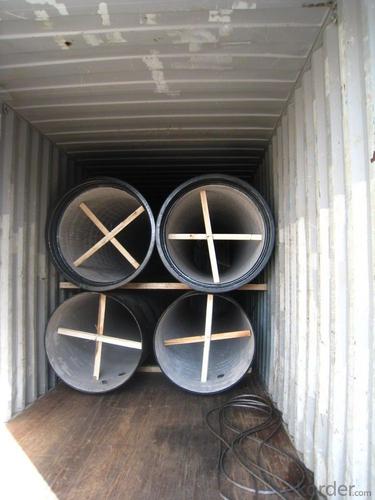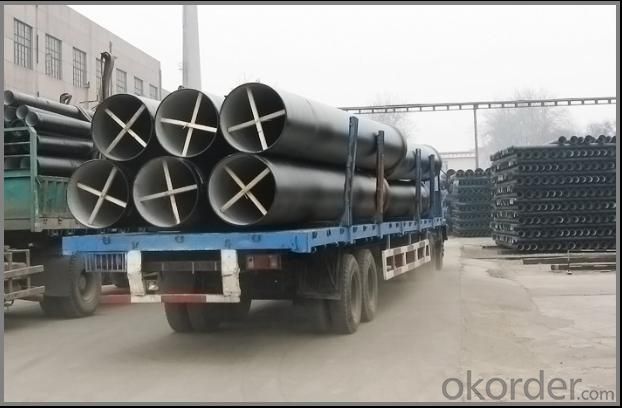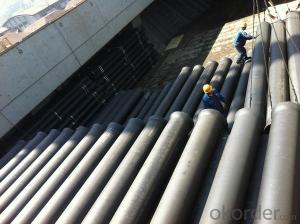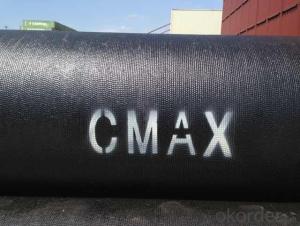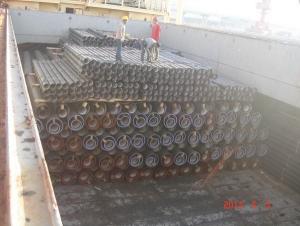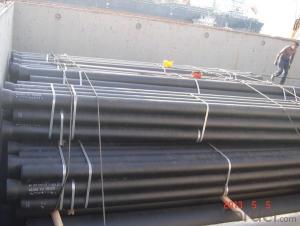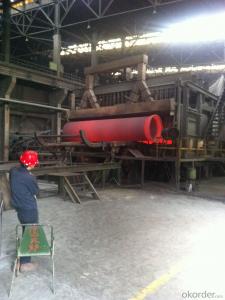DUCTILE IRON PIPE DN1000 K7CLASS
- Loading Port:
- Tianjin
- Payment Terms:
- TT OR LC
- Min Order Qty:
- -
- Supply Capability:
- 30000Tons m/month
OKorder Service Pledge
OKorder Financial Service
You Might Also Like
CNBM ductile iron pipe ranges from DN80-DN1600mm (T-Type, Class K9), effective length 6m, comply with ISO2531 Standard
Company Profile
CNBM International Corporation is the leading production base and renowned supplier of Ductile Iron Water Pipe systems of both potable and waste water in China. We are constantly looking to develop high quality products to ensure the longest service life and wonderful performance.
CNBM Pipelines regard quality as the essential factor leading to successful business. Every pipe is tested in accordance with BS EN545 (water application) or BS EN598 (sewer application). CNBM Pipelines products comply with and are tested according to the relevant European and International Standards. Our pipes are manufactured under the quality management system BS EN ISO 9001. After years of efforts, CNBM Pipelines has built up great reputation in terms of quality and service among customers worldwide
Product Introduction
CNBM ductile iron pipe ranges from DN80-DN1600mm (Tyton, T-Type, Class K7/K8/K9), effective length: 6m, complying with BS EN545/EN598/ISO2531/BS4772.
Specification& Payment terms
Internal lining: Pipes shall have an internal cement mortar lining in acc with ISO4179.
External coating: Pipes shall be externally coated with metallic zinc spray plus a further layer of resin painting to ISO8179.
Gasket: 100% SBR/NBR/EPDM gasket in accordance with ISO4633.
Packing: Pipes from DN100 to DN300 be bundled with steel belts, the others are in bulk.
Payment term: By 30% T/T advance payment + 70% Irrevocable L/C at sight.
Packing: In bulk vessel or in container.
- Q: The difference between ductile cast iron pipe and machine-made cast iron pipe
- Different appearance, ductile iron pipe single length of 6 meters, large wall thickness; mechanism cast iron pipe single length of 3 meters, the wall thickness is thin.
- Q: What is the relationship between continuous cast iron pipe and ductile iron pipe?
- In general, the continuous cast iron pipe is the continuous casting of gray cast iron pipe, while the centrifugal cast iron pipe is centrifugal ductile iron pipe. Of course, you have to be hard, just to make continuous ductile iron pipes, that's what you want.
- Q: Can ductile iron pipes be used for wastewater pumping stations?
- Yes, ductile iron pipes can be used for wastewater pumping stations. Ductile iron pipes have excellent strength and durability, making them suitable for transporting wastewater and handling the high pressures and corrosive nature of the sewage. Additionally, ductile iron pipes have a smooth interior surface, which prevents clogs and allows for efficient flow of wastewater. These pipes are also resistant to damage from external factors such as soil movement or heavy traffic, making them a reliable choice for wastewater pumping stations.
- Q: Are ductile iron pipes suitable for railway crossings?
- Yes, ductile iron pipes are suitable for railway crossings. Ductile iron has excellent strength and durability, making it capable of withstanding heavy loads and vibrations caused by passing trains. Additionally, its corrosion resistance properties make it a reliable choice for long-term use in this specific application.
- Q: How does ductile iron pipe resist internal corrosion?
- Ductile iron pipe resists internal corrosion through a combination of its unique material properties and protective coatings. Firstly, ductile iron, also known as nodular cast iron, is made by adding magnesium to molten iron, which causes the graphite in the material to be nodular or spherical in shape. This results in a more flexible and elastic material compared to traditional cast iron, making it less prone to cracking or fracturing under stress. Additionally, ductile iron has a dense, microstructure with a high carbon content, which acts as a barrier to prevent corrosive elements from penetrating the pipe's surface. This inherent resistance to corrosion makes ductile iron pipe suitable for carrying various fluids such as water, sewage, and chemicals without the risk of degradation over time. Furthermore, ductile iron pipes are often internally lined with protective coatings to further enhance their resistance to corrosion. These coatings, such as cement mortar or epoxy, create a barrier between the pipe's surface and the fluid it carries, preventing direct contact and reducing the likelihood of corrosion. These linings are applied during the manufacturing process, ensuring a consistent and durable protection throughout the entire length of the pipe. In summary, ductile iron pipe resists internal corrosion due to its material composition, including the nodular graphite structure and high carbon content, as well as the application of protective coatings. This combination of factors ensures the longevity and reliability of ductile iron pipes in various applications, even in corrosive environments.
- Q: What is the disadvantage of nodular cast iron in excess of silicon?
- Excessive silicon control results in the formation of nodular graphite in large cross section ductile iron and reduces the mechanical properties of castings.
- Q: Can ductile iron pipes be used in underground installations?
- Indeed, underground installations can utilize ductile iron pipes. These pipes are frequently employed in a multitude of subterranean scenarios, such as water distribution systems, sewer systems, and underground fire mains. Their notable attributes encompass robustness, endurance, and resistance to both external strains and corrosion, rendering them fitting for underground installations. Moreover, ductile iron pipes exhibit remarkable adaptability to ground movements and possess the capacity to endure substantial traffic loads. Consequently, they represent a dependable option for underground installations, particularly when stability and longevity emerge as pivotal considerations.
- Q: Can ductile iron pipes be used for both water and sewer applications?
- Yes, ductile iron pipes can be used for both water and sewer applications. Ductile iron pipes are highly durable and have excellent resistance to corrosion, making them suitable for carrying both potable water and wastewater. They can withstand high pressure and are resistant to external loads, making them ideal for underground installations. Additionally, ductile iron pipes have a long service life and require minimal maintenance, making them a cost-effective choice for both water and sewer systems.
- Q: Can ductile iron pipes be used for water treatment plants?
- Yes, ductile iron pipes can be used for water treatment plants. Ductile iron pipes are often chosen for water treatment plants due to their durability, strength, and corrosion resistance. They can handle high-pressure water systems and are resistant to wear and tear, making them suitable for transporting treated water in large quantities. Additionally, ductile iron pipes have a long lifespan, which reduces the need for frequent replacements and maintenance, making them a cost-effective choice for water treatment plants.
- Q: Are ductile iron pipes resistant to environmental stress cracking?
- Indeed, environmental stress cracking is not a concern for ductile iron pipes. Ductile iron, a form of cast iron that has been infused with small amounts of magnesium for enhanced strength and ductility, possesses this advantageous quality. Consequently, these pipes exhibit exceptional resistance to cracking and harm caused by environmental stress factors like temperature fluctuations, soil shifting, and corrosive elements present in the surrounding environment. Moreover, the inherent robustness and adaptability of ductile iron enable it to endure substantial external pressure and stress without succumbing to cracking or failure. Ultimately, ductile iron pipes are a dependable and long-lasting option for various purposes, such as the transportation of water and wastewater, thanks to their ability to withstand environmental stress cracking.
Send your message to us
DUCTILE IRON PIPE DN1000 K7CLASS
- Loading Port:
- Tianjin
- Payment Terms:
- TT OR LC
- Min Order Qty:
- -
- Supply Capability:
- 30000Tons m/month
OKorder Service Pledge
OKorder Financial Service
Similar products
Hot products
Hot Searches
Related keywords
